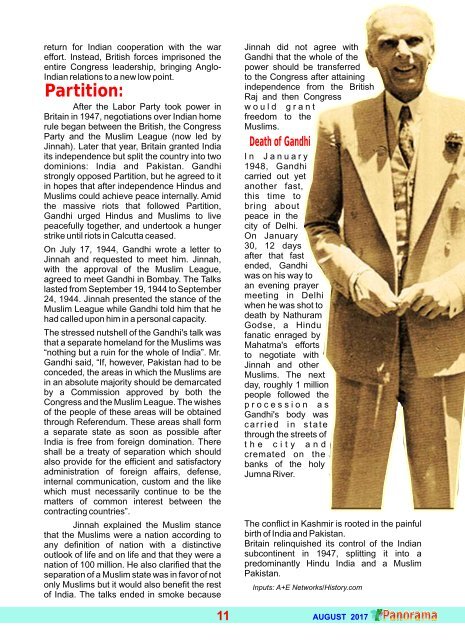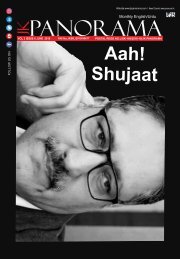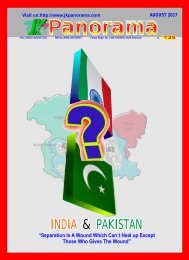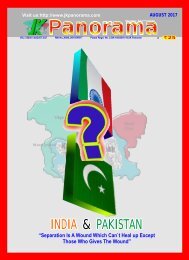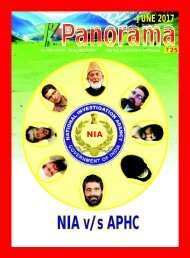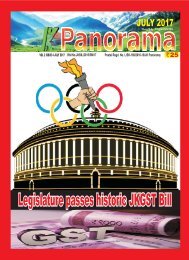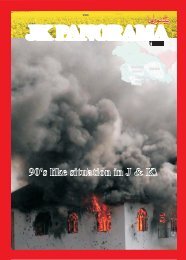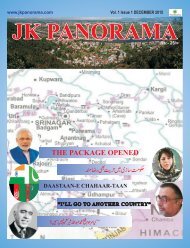JK PANORAMA LATEST ISSUE
You also want an ePaper? Increase the reach of your titles
YUMPU automatically turns print PDFs into web optimized ePapers that Google loves.
eturn for Indian cooperation with the war<br />
effort. Instead, British forces imprisoned the<br />
entire Congress leadership, bringing Anglo-<br />
Indian relations to a new low point.<br />
Partition:<br />
After the Labor Party took power in<br />
Britain in 1947, negotiations over Indian home<br />
rule began between the British, the Congress<br />
Party and the Muslim League (now led by<br />
Jinnah). Later that year, Britain granted India<br />
its independence but split the country into two<br />
dominions: India and Pakistan. Gandhi<br />
strongly opposed Partition, but he agreed to it<br />
in hopes that after independence Hindus and<br />
Muslims could achieve peace internally. Amid<br />
the massive riots that followed Partition,<br />
Gandhi urged Hindus and Muslims to live<br />
peacefully together, and undertook a hunger<br />
strike until riots in Calcutta ceased.<br />
On July 17, 1944, Gandhi wrote a letter to<br />
Jinnah and requested to meet him. Jinnah,<br />
with the approval of the Muslim League,<br />
agreed to meet Gandhi in Bombay. The Talks<br />
lasted from September 19, 1944 to September<br />
24, 1944. Jinnah presented the stance of the<br />
Muslim League while Gandhi told him that he<br />
had called upon him in a personal capacity.<br />
The stressed nutshell of the Gandhi's talk was<br />
that a separate homeland for the Muslims was<br />
“nothing but a ruin for the whole of India”. Mr.<br />
Gandhi said, “If, however, Pakistan had to be<br />
conceded, the areas in which the Muslims are<br />
in an absolute majority should be demarcated<br />
by a Commission approved by both the<br />
Congress and the Muslim League. The wishes<br />
of the people of these areas will be obtained<br />
through Referendum. These areas shall form<br />
a separate state as soon as possible after<br />
India is free from foreign domination. There<br />
shall be a treaty of separation which should<br />
also provide for the efficient and satisfactory<br />
administration of foreign affairs, defense,<br />
internal communication, custom and the like<br />
which must necessarily continue to be the<br />
matters of common interest between the<br />
contracting countries”.<br />
Jinnah explained the Muslim stance<br />
that the Muslims were a nation according to<br />
any definition of nation with a distinctive<br />
outlook of life and on life and that they were a<br />
nation of 100 million. He also clarified that the<br />
separation of a Muslim state was in favor of not<br />
only Muslims but it would also benefit the rest<br />
of India. The talks ended in smoke because<br />
Jinnah did not agree with<br />
Gandhi that the whole of the<br />
power should be transferred<br />
to the Congress after attaining<br />
independence from the British<br />
Raj and then Congress<br />
w o u l d g r a n t<br />
freedom to the<br />
Muslims.<br />
Death of Gandhi<br />
I n J a n u a r y<br />
1948, Gandhi<br />
carried out yet<br />
another fast,<br />
this time to<br />
bring about<br />
peace in the<br />
city of Delhi.<br />
On January<br />
30, 12 days<br />
after that fast<br />
ended, Gandhi<br />
was on his way to<br />
an evening prayer<br />
meeting in Delhi<br />
when he was shot to<br />
death by Nathuram<br />
Godse, a Hindu<br />
fanatic enraged by<br />
Mahatma's efforts<br />
to negotiate with<br />
Jinnah and other<br />
Muslims. The next<br />
day, roughly 1 million<br />
people followed the<br />
p r o c e s s i o n a s<br />
Gandhi's body was<br />
c a r r i e d i n s t a t e<br />
through the streets of<br />
t h e c i t y a n d<br />
cremated on the<br />
banks of the holy<br />
Jumna River.<br />
The conflict in Kashmir is rooted in the painful<br />
birth of India and Pakistan.<br />
Britain relinquished its control of the Indian<br />
subcontinent in 1947, splitting it into a<br />
predominantly Hindu India and a Muslim<br />
Pakistan.<br />
Inputs: A+E Networks/History.com<br />
anor<br />
11 AUGUST 2017 P a<br />
ma


